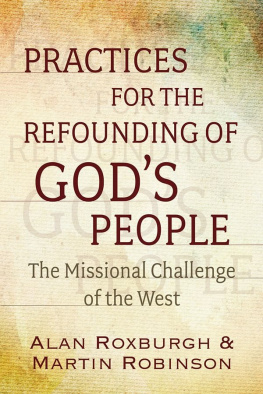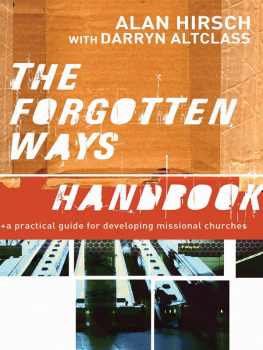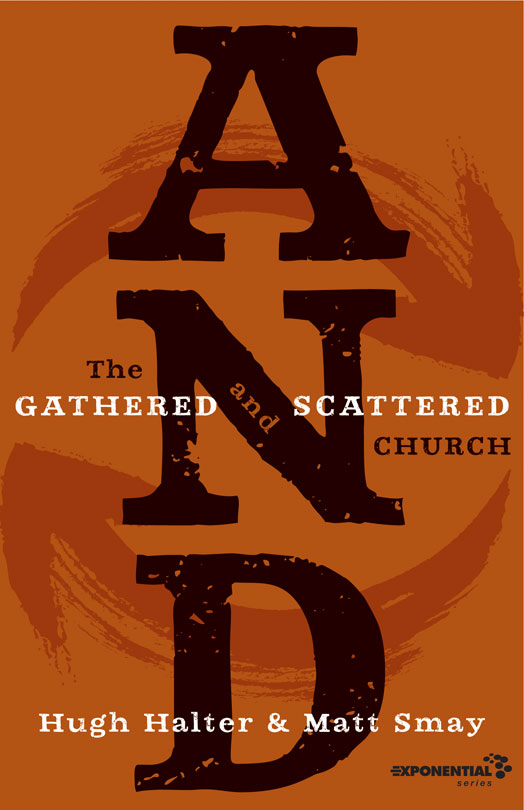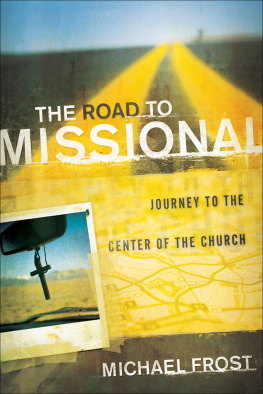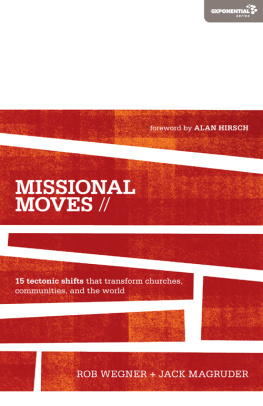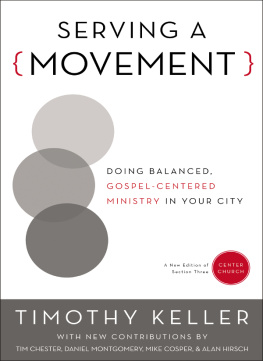OTHER LEADERSHIP NETWORK TITLES
The Ascent of a Leader: How Ordinary Relationships Develop Extraordinary Character and Influence, by Bill Thrall, Bruce McNicol, and Ken McElrath
The Elephant in the Boardroom: Speaking the Unspoken about Pastoral Transitions by Carolyn Weese and J. Russell Crabtree
The Leaders Journey: Accepting the Call to Personal and Congregational Transformation, by Jim Herrington, Robert Creech, and Trisha Taylor
Leading Congregational Change: A Practical Guide for the Transformational Journey, by Jim Herrington, Mike Bonem, and James H. Furr
Leading Congregational Change Workbook, by James H. Furr, Mike Bonem, and Jim Herrington
Leading the Team-Based Church: How Pastors and Church Staffs Can Grow Together into a Powerful Fellowship of Leaders, by George Cladis
The Millennium Matrix: Reclaiming the Past, Reframing the Future of the Church, by M. Rex Miller
A New Kind of Christian: A Tale of Two Friends on a Spiritual Journey, by Brian McLaren
The Present Future: Six Tough Questions for the Church, by Reggie McNeal
The Story We Find Ourselves in: Further Adventures of a New Kind of Christian, by Brian McLaren
A Work of Heart, by Reggie McNeal

Copyright 2004 by John Wiley & Sons, Inc. All rights reserved.
Published by Jossey-Bass
A Wiley Imprint
989 Market Street, San Francisco, CA 94103-1741 www.josseybass.com
No part of this publication may be reproduced, stored in a retrieval system, or transmitted in any form or by any means, electronic, mechanical, photocopying, recording, scanning, or otherwise, except as permitted under Section 107 or 108 of the 1976 United States Copyright Act, without either the prior written permission of the Publisher, or authorization through payment of the appropriate per-copy fee to the Copyright Clearance Center, Inc., 222 Rosewood Drive, Danvers, MA 01923, 978-646-8600, fax 978-750-4470, or on the web at .
The assessments that appear in this book (except those for which reprint permission must be obtained from the primary sources) are designed for use in a group setting and may be reproduced for educational/training activities. We do, however, require that the following statement appear on all reproductions:
Copyright 2004 by John Wiley & Sons, Inc.
This free permission is limited to the reproduction of material for educational/training events. Systematic or large-scale reproduction or distribution (more than one hundred copies per page per year)or inclusion of items in publications for salemay be done only with prior written permission. Also, reproduction on computer disk or by any other electronic means requires prior written permission.
Jossey-Bass books and products are available through most bookstores. To contact Jossey-Bass directly call our Customer Care Department within the U.S. at 800-956-7739, outside the U.S. at 317-572-3986 or fax 317-572-4002.
Jossey-Bass also publishes its books in a variety of electronic formats. Some content that appears in print may not be available in electronic books.
Unless otherwise noted, Scripture quotations taken from the New American Standard Bible, Copyright 1960, 1962, 1963, 1968, 1971, 1972, 1973, 1975, 1977, 1995 by The Lockman Foundation Used by permission. ( www.Lockman.org )
Library of Congress Cataloging-in-Publication Data
Minatrea, Milfred.
Shaped by Gods heart: the passion and practices of missional churches / Milfred Minatrea.
p. cm.
Includes bibliographical references.
ISBN 0-7879-7111-1 (alk. paper)
1. Mission of the church. I. Title.
BV601.8.M57 2004
253dc22
2004006648
CONTENTS
PREFACE: A PERSONAL LETTER TO THE READER
After more than twenty years of serving Christ, I know that the church can also be a dynamic experience of personal transformation, where individuals connect with God in profoundly intimate and personal ways, and in a powerful corporate connection as a whole body. Together, members exhibit the power of God at work in their lives, making the church winsome to outsiders and influential in communities. This church is optimistic: it believes itself to be the dwelling of God, uniquely empowered by His Spirit, living the transformational reality of His Kingdom in contemporary society.
Yet for many His church has become not a place of relationship but merely a place where people gather for religious ceremonies. Members belong to the church just as they may belong to the Lions or Rotary Club. They go to church, but often they do not see themselves as the church. Even parishioners speak of the facilities where they meet as the church. What was intended by God as a living Body has been reduced to bricks and mortar, a building made with hands.
What has happened?
Many churches are vestiges of a former community that long ago underwent significant change. Parishioners became part of a church when they first moved into a growing community. In church, they established enduring relationships with people who held similar values. Their children were confirmed, baptized, and married in those sacred places. As the community changed across the years, members sold their homes and moved away. Yet they continued to drive back each week to enjoy the web of relationships that was their church, their dearest friends. They continued to worship but lost touch with the community around them. Increasingly, church became isolated from the world rather than engaged with the world.
As missionthe purpose of inviting and equipping individuals to be authentic disciples of Christgave way to maintenance of the status quo, people have grown weary of going through the motions of religious trappings without experiencing personal intimacy with God. Our world is filled with individuals whose lives manifest their deep hunger for something more than the nominal religious experiences they have observed thus far. They know something more exists; they just do not know how to get there. They search for a different type of churchand that church does exist today.
This church is not limited by geography or denomination. It is found across the globe in an increasing number of places where leaders have been willing to lose everything to gain something that was almost lost. They have caught a glimpse of God and are unwilling to settle for anything less than intimate relationship with Him. In this pursuit, they are rediscovering the authentic relationship that develops among fellow pilgrims on that path, members together in the Body of Christ. Those churches are preparing members, and holding each other accountable, to live as representatives for God in their individual spheres of influence, in their world. These are missional churches, reproducing communities of authentic disciples, being equipped as missionaries sent by God, to live and proclaim His Kingdom in their world.
One might say this is a new kind of church, but I would say that it is some two thousand years old. It is reclaiming the intent for which Christ established His church. In many ways, contemporary society is very close to the first-century experience. It is pluralistic, profoundly spiritual, but not necessarily Christian. Major ethical issues challenge social structures. Global distribution of wealth favors a privileged few whose responsibility to exercise compassionate concern for those in poverty is often lost to a me-first mentality.
Yet the missional church is not a first-century church; it is a twenty-first-century church committed to use every means available to accomplish Gods missional purpose in the earth. Such churches are connecting members intimately with God and involving them in His mission around the world. They use global communication and transportation systems to gain information and extend influence. They are not content simply to provide financial resources so that a few select individuals can be involved in global missions. They are on mission as individuals and as communities of faith.


